Torn Away review – The tears may come in this emotionally powerful, wonderfully varied WWII child escape adventure
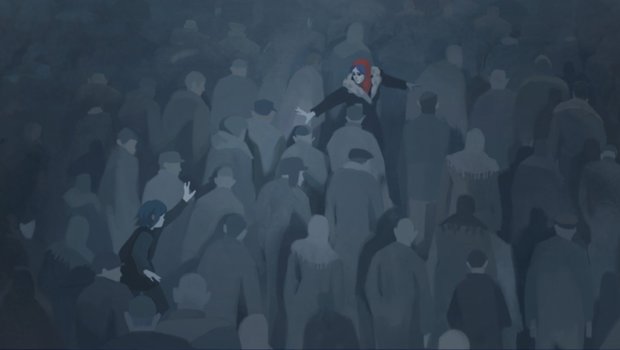
- 0 Comments
Before I started playing Torn Away, I already felt that peculiar pressure in my eyes that heralds the arrival of tears. Loading the game gave me goosebumps. I was expecting so much from a story about a ten-year-old Russian girl imprisoned in a WWII labor camp, who escapes and must make her way back through Germany and Poland to get home. And I was intrigued by the variety of gameplay promised throughout its many different locales. There’s the classic adventure game fare where you explore scenes for items to use; there’s the side-scrolling puzzle-platforming and stealth sections; and then there’s the first-person walking simulator-style sections, along with a couple of mini-games. It turns out much of the gameplay is somewhat on the casual side, but this is an emotionally powerful, story-heavy premise in a setting that never gets old – and oh boy, does it deliver.
Stalingrad, 1942. Asya is home alone. Her mother is at work, her father is fighting at the front. Asya wants to surprise her mom when she gets back home by making a drawing of her family, playing some music she likes, and mending a torn mitten that belonged to her dad. You explore the house using WASD or the directional keys in search of a way to achieve these goals. Hotspots are indicated by either an eye or a hand icon when you’re close enough, and you can click the action key to get a response from Asya or to investigate further.
In close-ups, like when you examine the desk in Asya’s room, a mouse cursor becomes active and you can click the objects available. You can rotate items you pick up and will occasionally find the odd hidden secret. Asya can also jump and crouch to search high and low places, like on top of a shelf or under a table, but these abilities become far more functional in later levels with different gameplay.
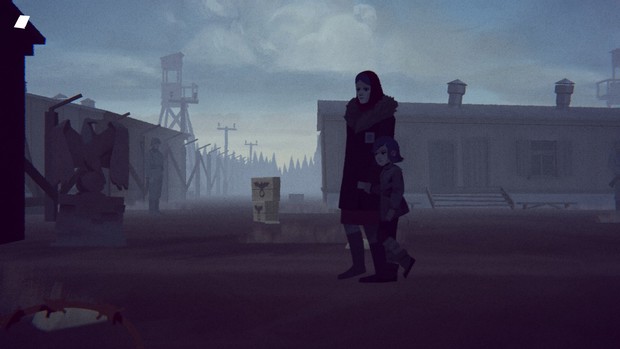
Scenes like this involve very basic gameplay, perhaps even a bit too easy for my taste. Asya is ten years old, and this part feels like it’s similarly designed for someone this age. Then again, it’s a game trying to portray the reality of a true historical era, and real life doesn’t consist of complicated puzzles. Instead you get several mouse-controlled mini-games where you have to perform simple tasks to make these chapters a bit more active, such as when you want to prepare lunch and need to peel potatoes, or when you have to clean and mend soldiers’ boots in the labor camp. They all ask for just a little bit of sleight of hand, usually of the click-and-drag variety.
During the introductory chapter, Asya has “conversations” with her toys: Arkady, her old hobbyhorse, taking the role of wise mentor; and Madame, an uppity doll in a red dress, criticizing everything. One of your initial objectives is to create a new friend in the form of a blue mitten with buttons for eyes. This companion will guide you throughout the game and act as a kind of audio commentary, not only describing what’s going on around you but also giving clues and generally just telling you what you need to do. This makes Torn Away a very straightforward game, because you hardly have to think for yourself. There are times when you might wish “Comrade Mitten” would just shut up for a minute.
Tragically for Asya, of course, her peaceful life at home doesn’t continue for long, as she and her mother are soon captured, taken far from home and forced to live in a Nazi concentration camp under horrendous circumstances before the young heroine is able to escape. Asya meets several NPCs on her journey, including the other women in the labor camp, a German woman giving her shelter, a crashed airplane pilot needing her help, a workman who helps her hide, and a friendly farmer with a horse and carriage, among others. Most of the stories about the war and the impact on the local population is conveyed through these characters, explaining what’s been going on in their world.
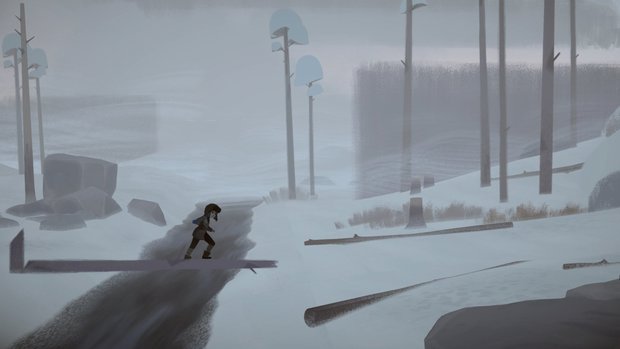
Asya makes a note of everything she encounters, and she’ll fill in the gaps between chapters, recounting in diary style what you have witnessed, as well as the parts of her story you don’t see. You might want to access her journal – a scrapbook of her adventures – to catch your breath after a particularly intense sequence and read up on her thoughts about the experience. She’ll also collect letters in this scrapbook, which you can find during your explorations.
Torn Away is a Russian game, and I first played it with the original voice-overs for authenticity’s sake. I checked out the English dubbing later, but I think the native voices spoiled me a bit; playing that way a second time through felt weird due to the variety of accents. I might be mistaken, but it sounded to me like Asya’s mom suddenly spoke with an American southern drawl, and the farmer sounded a bit Scottish. The pilot and the workman had still other accents that didn’t sound at all how I imagined. The acting itself is certainly okay, with all characters being quite articulate and expressive, the best being Comrade Mitten. I actually preferred his English voice actor; since he easily has the most lines, it was nice to actually understand what he was saying, and he reminded me a bit of Paul Rudd. Subtitles come in a variety of languages, and I didn’t notice anything amiss with either grammar or vocabulary in the English localization. During in-game conversations, the dialogue remains on-screen until you click it away.
The hand-painted graphics are awesome, with a grainy filter as if you’re watching the story unfold on an old television set. A black-and-white presentation would have further added to that effect, but Torn Away effectively uses color contrast to set a unique mood for each chapter: lots of colors for the happy home situation, white wintery landscapes for moments of peace and to symbolize Asya’s innocence, and dark gray tones for all military elements. The game’s original soundtrack is “inspired by the music of Hayao Miyazaki's movies, French New Wave cinema and experimental electronic music.” I can’t really judge those statements, but at times I really felt like I was watching an Oscar-winning war movie like Saving Private Ryan, Dunkirk or 1917, with great cinematographic effects and a tension-building score.
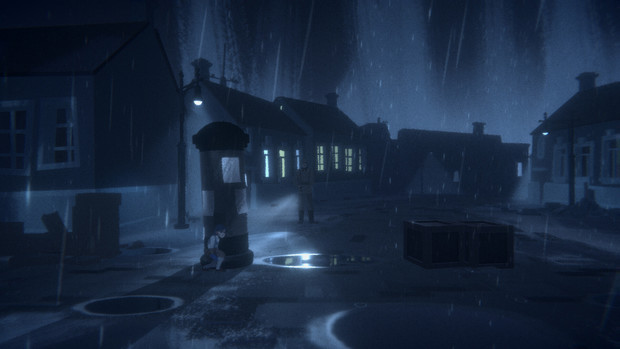
The gameplay really kicks into gear with its first stealth section, which reminded me very much of Playdead’s Inside. The childlike atmosphere of the prologue gives way to a base survival instinct here. What starts as a serene stroll through snowy woods with Asya mesmerized by a white rabbit she’s trying to catch, suddenly transforms as a gunshot breaks the fairy tale and the harsh and dangerous reality of the war around her captured my breath for the remainder of that chapter. It’s tangibly stressful with danger everywhere, bullets flying, and buildings collapsing. There’s even more peril on the road Asya follows after her escape from the labor camp, but fear not – should soldiers catch you in their flashlight beams, or if a bullet gets too close, the screen turns black before what would have been a graphic demise, and you respawn right before you reached that particular obstacle.
These more action-packed, puzzle-platforming-style chapters get increasingly harder, and you’ll have to do quite a lot of jumping, climbing and pushing objects. They take a fair bit of dexterity, which might not be to every adventure gamer’s taste. But even though I had to retry a few sections because I didn’t time my jumps right, I liked these chapters because they stood in stark contrast with the more casual parts. And the tension they provide elicits an emotional eruption whenever Asya encounters yet another setback.
The third and final type of gameplay sees you looking through Asya’s eyes, trying to find your way through several locations on the road home. In first-person point of view, you’ll have to reach a cabin during a snowstorm, seeking shelter behind some large rocks to prevent the wind from halting your progress. Later on you’ll have to navigate a dark forest while keeping your eye on a friendly plane flying overhead. But the most intense bit is when you suddenly find yourself stuck in the maze of trenches, explosions on all sides, dead bodies strewn in the corners, and a real sense of imminent death at every corner you turn.
Seeing such horrendous things happening all around you has a strong emotional impact, but there are many plot developments that really hit you in the feels. Horrific things happen to Asya herself during the game, which I wouldn’t dare spoil. Just know that more than once I covered my gasping mouth with both hands, like the initial reaction of an overprotective parent seeing their child tumble down the wrong side of a slide. And when the camera zooms in on Asya’s big eyes as a piano piece crescendoes, you just wish you could drop the controls, pick her up for real and pull her through the computer screen, hug her and physically carry her to safety.
Final Verdict
Sadly, war is timeless, as many people today can still attest, and its casualties extend far beyond soldiers on the battlefield. Torn Away is the story of one of those innocent victims not standing idly by but taking action and letting her hope for a happy ending guide her through all kinds of hardship. Offering only casual adventure-style gameplay in between the more challenging puzzle-platforming sections, the game focuses on Asya’s travails, experiences a ten-year-old girl should never have to face. In doing so it certainly entertains, but it also makes you think, and especially makes you feel. This young protagonist is no action hero, certainly no superhero – not even an adult more equipped to handle these situations. In the four hours it took me to play, I forgot my privileged life and felt like I was there with her, increasingly dismayed each time her story encountered a new nasty surprise. The dark subject matter means it’s not “fun” in the traditional sense, but if you like the human side of war stories, be sure to bring the Kleenex because it’s you who won’t be able to tear yourself away.
Hot take
Torn Away is a beautifully produced narrative adventure with various gameplay elements that hits you hard in the feels as you guide a ten-year-old child back home to her family across a continent ravaged by war.
Pros
- Distinct variety of gameplay between different sections
- A gut-wrenching emotional story
- Oscar-worthy cinematography and soundtrack
Cons
- Missing some good puzzle challenge
- Some tricky platforming
Johnny played Torn Away on PC using a review code provided by the game's publisher.


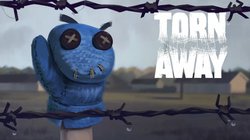
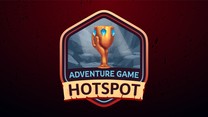

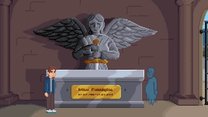


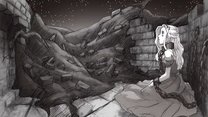

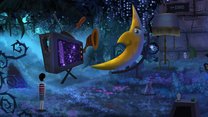
0 Comments
Want to join the discussion? Leave a comment as guest, sign in or register in our forums.
Leave a comment